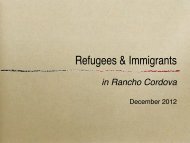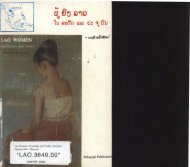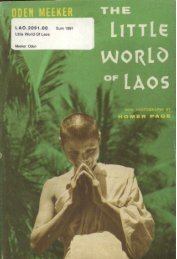PEOPLE
Grant, The Boat People - Refugee Educators' Network
Grant, The Boat People - Refugee Educators' Network
- No tags were found...
Create successful ePaper yourself
Turn your PDF publications into a flip-book with our unique Google optimized e-Paper software.
inability to conceive of a person who abandons his country. Of all<br />
poople, the Japancse have shown least enthusiasm for emigmtion<br />
chemsclw, Their attachment to thtir own country, however<br />
unkindly it treats them, is so absolute that they regard leaving im<br />
show as n denial of self, a kind of suicide.<br />
Professor Michio Royarna, profcssor of inmatima1 politia at<br />
Sophia university in Tokyo, says that despite appearancts, Japan was<br />
not mly intcmaionalized.<br />
1t'~ all been one-way ttaffic. Wc end pple out to fweign countries, and<br />
hey return with useful ideas. BUI we nil1 do not accept fohcignm into our<br />
weicty in my real sen=. The prd of this is in rhc Japllncac universities,<br />
which should know bm*; but which exclude foreigner8 from hru teaching<br />
staff, except as tcachcn of foreign languages.<br />
Professor Kei Wakaizumi, professor of international politics at<br />
Kyoto Sangyo university, says Japan= should not bc criticized,<br />
Wt arc only human beinp, who undermnd human behaviour from OW own<br />
experience. Japan is a cwnuy of consensus, It i~ homogcneolis, if not in rhc<br />
strict recisl me, then certninly CU~N~~~Y,<br />
to a dtgm unique among nation#,<br />
We m~ot imagine s conflia where, at the md of it, a perm bccome~ A<br />
refugee. For that reason we find it difficult to accept a pem who is a rcfu-<br />
gee,<br />
This is not sophistry, but an honestly held view common among<br />
intelligent Japanese who know very well how the rest of the world<br />
thinks. Such views sound arrogant: but the Japanese make no such<br />
show when they advance them, rather the contrary. Japnesc<br />
strongly klitvt that the Vietnamese should not capon their problems:<br />
the Japanese would not drive out their own people in the way<br />
Viemam has. Holding such a view, che cxclusion~iy poliq of the<br />
Japntst is arguably their most realistic solution, And, in view of<br />
the asualty rate among dcsperete boat pcople, who is to say that the<br />
toll would have btcn higher if the Vietnamese had brcn obliged from<br />
the stan to sort out their differences, as the Japnnese suggest hey<br />
would do in similar circumsmnccs?<br />
At the penonal level the Japanese view looks crude and scifish.<br />
One Japncsc confided:<br />
We blame the refugees as much 0s we blame the Viemarnew government<br />
Either they're criminals, or they're we&-willed people. Whatever t hy w,<br />
we do nor undErstand why they cant remain in rhek own society to help<br />
rebuild it after nll their fighting. Some of Phe refugees may bc good people,<br />
unfairly treated by their government. But how are we to know than from<br />
he mt. And how do such problems become our responsibility in the fint<br />
place?<br />
Profewr Wakaizumi says he understands such feelings of ordinary<br />
Japanese and even pardy shares them himelf.<br />
I rm ambivalent in my attirude. It is clear that 40 reasonable human kinp<br />
we should open dmrs and welcome refuge= from wherever they come.<br />
There is no qucstion abut that on humanist grounds. h d at the same time<br />
we must mske cv*y effort to urge the Vkmarncse government to stop thm<br />
muocities and unacccpmble policies that give rise to the problem. But w h<br />
it comes down to the qucstion of realistic sdon we should tat here in Japn,<br />
this rather inexplicable emotion, this psychology of ours, comes to the fore<br />
and dictates our policy. I would not say it is a mist attitude, be~~usc as you<br />
know as individuals we're hospimble and rcdy to welcome others, imspeetive<br />
of race. But to have refugees settle down in Japan d mat them just<br />
like our friends and ncighbours, without prejudice or preconctption8 - well,<br />
we hve diffieulry.<br />
Pmfewr Wakaizumi sccs the problem as one of human relations,<br />
and the fear held by Japanese that they will simply fail to get along<br />
with the Vietnamese if they come in substantial numbers. This personal<br />
fear weighs more than any absbact ida of humanity, and far<br />
more than any rema consideration of international politia, such<br />
as taking China's side against Viemam. It comes back to Japan's<br />
Korean minority, a case of the most vicious of vicious circles. The<br />
Chinese minority, once about 100 000, has melted fairly thoroughly,<br />
Many thousands have taken Republic of China (Taiwan) nationality;<br />
far fewer have d en kople'a Republic of China nationality; about<br />
50 000 haw mght and have gained, or are in the process of gaining,<br />
Japanme nationality. The Koreans are different. ('They are more<br />
homogeneous, more nationalistic, more like us,' says Professor<br />
Royama.) Few Japanese-born Korems have chosen to mkc either<br />
North or South Korean passports, and only a few have applied for<br />
Japanese nationality. They say that the procedures arc long and

















